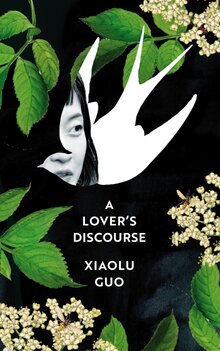
The lover: a Chinese woman who moves to London to study for a PhD. At a picnic one day, she sees a man picking elderflowers. She meets him again at a book club, and they get talking. From such random moments, love blossoms.
The discourse: a chronicle of the woman’s new life and an examination of her love, inspired by Barthes’ book of the same name (which I haven’t read). It’s told in a series of short chapters, snapshots in time.
Each chapter of Xiaolu Guo’s latest novel begins with a brief passage of dialogue that appears in the text later on. For me, this affects the experience of reading in two key ways. First, it emphasises the fragmented structure: you recognise the dialogue when you read it again, and the chapter seems to revolve around it, to become a self-contained piece. Second, the dialogue starts to feel more like a performance.
We end up with a love story that’s ragged in form rather than smooth. This is appropriate, because the experience of moving to London is far from smooth for Guo’s protagonist. There are immediate issues such as unfamiliar terminology (the word ‘Brexit’ appears everywhere when our narrator moves over, but not in her dictionary) and loneliness (“What were we supposed to do at night in our rented rooms, if we didn’t drink or watch sports?”).
As time goes on, the stumbling-blocks evolve, becoming subtler and, in some ways, more profound. The narrator would like to put down roots, but her partner is much more at ease with a transient lifestyle – at one point, they move into a houseboat, but it’s not her idea of home. The protagonist’s boyfriend is German-Australian, with family in both countries, while her parents have both passed away. Unlike her, he is at home in multiple cultures, and comfortable moving between them.
Language itself is a contested space for Guo’s narrator. In one chapter she’s at a New Year’s Eve party where her partner is conversing in English and German, and she can’t follow it:
I thought, even though I speak English, and I can read and write in English, still, I feel monolingual. Really, I had only one language. And even worse, I could not possess this language…Whatever I spoke, whether it was my borrowed English language or my native Chinese Mandarin, I didn’t feel I had that language in me. That language spoke for me, instead of my speaking it.
So perhaps we could see this lover’s discourse as her essay at working through her feelings, taking possession of what it is to live in this place, with this language. Guo’s novel is a love story which puts love to the test, because that’s what its protagonist needs in order to find solid ground in her life.
Published by Chatto & Windus.
Click here to read my other reviews of the 2020 Goldsmiths Prize shortlist.
 Silver Hill was an unremarkable village in Hunan, long since neglected by the Chinese government; until a peasant woman named Kwok Yun saw a ‘flying metal plate’ in the sky. The National Security and Intelligence Agency soon sends men to investigate; the results of this are chronicled in the documents which comprise the text of UFO in Her Eyes, as are the changes through which Silver Hill went in subsequent years. Shortly after seeing the UFO, Yun found and helped an injured Westerner – which inspired the latter to make a hefty donation to the village.
Silver Hill was an unremarkable village in Hunan, long since neglected by the Chinese government; until a peasant woman named Kwok Yun saw a ‘flying metal plate’ in the sky. The National Security and Intelligence Agency soon sends men to investigate; the results of this are chronicled in the documents which comprise the text of UFO in Her Eyes, as are the changes through which Silver Hill went in subsequent years. Shortly after seeing the UFO, Yun found and helped an injured Westerner – which inspired the latter to make a hefty donation to the village. Oscar Lowe wanted to go beyond the narrow horizons of his working-class upbringing in Watford; but the job he’s ended up in – care assistant at a Cambridge nursing home – isn’t all that different from the future his parents had in mind. But a random visit to a recital in King’s College chapel, and meeting the lovely Iris Bellwether there, brings him into contact with a more privileged world. Iris’s brother Eden is a brilliant but eccentric organist who believes he’s found a means of healing sickness through music – and there’s a chance he might be right.
Oscar Lowe wanted to go beyond the narrow horizons of his working-class upbringing in Watford; but the job he’s ended up in – care assistant at a Cambridge nursing home – isn’t all that different from the future his parents had in mind. But a random visit to a recital in King’s College chapel, and meeting the lovely Iris Bellwether there, brings him into contact with a more privileged world. Iris’s brother Eden is a brilliant but eccentric organist who believes he’s found a means of healing sickness through music – and there’s a chance he might be right.
Recent Comments